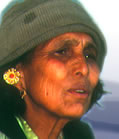THEMES IN THIS
TESTIMONY
Development

Economics

Education

Environment

Family Life

Festivals

Gender

Health

Identity

Click on arrows
to find more
testimonies
featuring
these themes
|
|
Sex
|
male
|
|
|
Age
|
77
|
|
|
Identity
|
Hindu, Magar caste
|
|
|
Occupation
|
farmer
|
|
|
Location
|
Dandajheri VDC, Nawalparasi
|
|
|
Date
|
January 1994
|
|
summary
Interview is particularly strong on the subject of the Magar people (the narrator’s caste): their distinctive identity; their strengths and weaknesses; and customs that are dying out, partly as a result of migration. He notes how the traditional culture of Magars “has not been found in the form of book. It came down from father to son and son to grandson then lost in oblivion”. He emphasises the importance of preserving and promoting the Magar language, which he fears will be wiped out since modern education uses the medium of Nepali – “if the government opens a school to teach Magar language, there will be many benefits”. The interviewer seems to be of the same caste and at points he contributes his own opinions as well as questions.
The interview also contains an interesting section on the narrator’s memories of World War 2, the reasons why the British employed Ghurkas and his own experience of active combat in the region (Burma, Thailand and elsewhere).
detailed breakdown
|
You will need a password from Panos to view the full
transcript of the interview. To apply for a password, click here.
Once you have a password, click here to go to the beginning
of the transcript. You can also click on any section of the
breakdown of content below and go straight to the
corresponding part of the transcript.
|
| Section 1-3 |
The narrator has two wives and except at busy times, the family provide sufficient labour for the farm. Describes the flexibility in an extended family system.
States typical characteristics of his caste. Says in the past, castes were divided between the plains and the hills.
Singing and dancing are criticised for being too costly. Village has no electricity, hence no films. Rather critical view of "merriment": “Merriment is also only for one or two days, it cannot feed us. It cannot earn money and it is only to make one happy. Singing and dancing are age-old traditions.”
|
| Section 4-5 |
Goes on to talk about Magar traditions that have been passed on orally (and thus have been lost). Says that celebratory customs haven't changed. Good description of traditional clothing. The loss of traditional dances is seen as both good and bad.
|
| Section 6-7 |
Moving to the plains has led to a loss in some of the caste's own traditions. Brief resume of Nepali history 50 years ago including why the British employed Gurkhas during the war. He was a soldier who was trained in India, and fought the Japanese in Burma, Thailand and Assam. Mentions that families of dead soldiers still receive a pension. Disturbing memories of active combat. Goes on to talk about the value of army pensions, and of how he bought land with his.
|
| Section 8-9 |
After the army he became a teacher. At first his earnings came from donations, but later he was salaried. Criticises lack of government action to improve education, and then moves on to discussing the lack of employment opportunities in Nepal.
Education among his caste: “The main reason for illiteracy as I told you earlier is they indulge in merriment most of the time. They do not concentrate on education.... They do not care for study after having beer and liquor. Because of uneducated parents of Magar, they do not care about education.” Argues teachers are useless if they can't speak the Magar language.
|
| Section 10-11 |
Suggests that the Magar's own language is being wiped out by Nepali, much to his regret: “They think Nepali language is important so they began to speak. So they have been giving up speaking Magar language.” He concludes that education will lead to its demise.
Recounts how a mission hospital was prevented from opening because of its Christian nature. Brief mention of common illnesses and maternal mortality
|
| Section 12 |
Talks about acquiring new agricultural techniques from outsiders. Suggests that soil fertility is decreasing - being washed away?
|
| Section 13 |
Returns to his memories of the army, which are entirely negative. Brief discussion of family decision-making. Suggests that Magars have a greater respect for women compared to other castes: “They (women) are maintaining [families] all their daily life, if they work hard for their family they must get respect too. In some couples the wife is more clever than the husband, in that case the wife has to maintain her family.”
Comments on lack of development or employment opportunities in the hills, and suggests that these are confined to the plains. Brief mention of inflation of prices.
|
|


